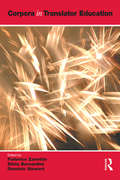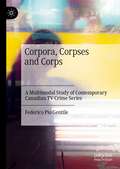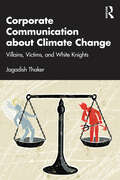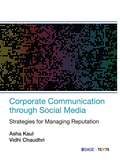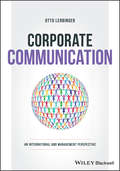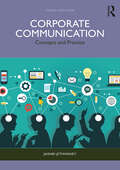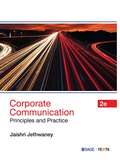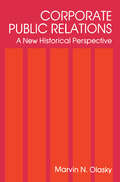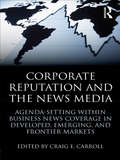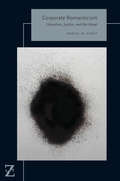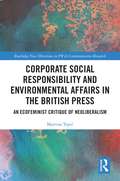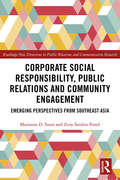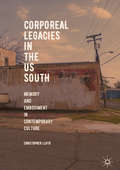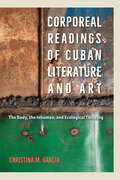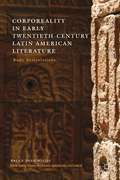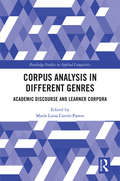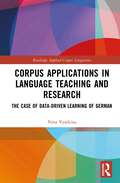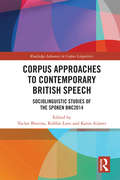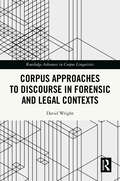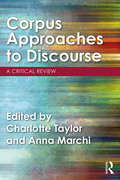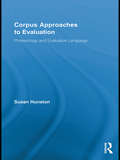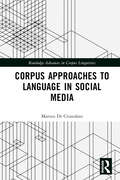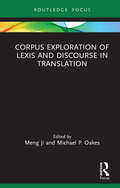- Table View
- List View
Corpora in Translator Education
by Federico Zanettin Dominic Stewart Silvia BernardiniThe use of language corpora as a resource in linguistics and language-related disciplines is now well-established. One of the many fields where the impact of corpora has been growing in recent years is translation, both at a descriptive and a practical level. The papers in this volume, which grew out of presentations at the conference Cult2k (Bertinoro, Italy, 2000), the second in the series Corpus Use and Learning to Translate, are principally concerned with the use of corpora as resources for the translator and as teaching and learning aids in the context of the translation classroom. This book offers a cross-section of research by some leading scholars in the field, who offer accounts of first-hand experience and theoretical insights into the various ways of building and using appropriate corpora in translation teaching, for the benefit of teachers and learners alike. The various contributions provide a rich source of inspiration for other researchers and practitioners concerned with 'corpora in translator education'. Contributors include Stig Johansson, Tony McEnery, Kirsten Malmkjær, Jennifer Pearson, Lynne Bowker, Krista Varantola, Belinda Maia and a number of other scholars.
Corpora, Corpses and Corps: A Multimodal Study of Contemporary Canadian TV Crime Series
by Federico Pio GentileThis book uses corpus and multimodal methods to present a comparative study of three major Canadian TV crime series, Flashpoint (2008-2010), Motive (2013-2015) and 19-2 (2014-2016), paying special attention to cinematic techniques. Following an overview of the methodology and the Canadian cultural milieu of the study, the author approaches the three series as complex cultural and linguistic productions that depend heavily on a national appropriation of a genre whose popularity is growing internationally. The book investigates the verbal, nonverbal and paraverbal strategies employed by each production to create the patterns that make this genre appealing to a variety of audiences, and uncovers some of the psychological processes at work in contemporary Canadian TV crime serials. This book will be of interest to scholars in fields including Corpus Linguistics, Multimodal Studies, Canadian Studies, Media and Communication Studies, and Specialised Discourse.
Corporate Character
by Eddy KentThe vastness of Britain's nineteenth-century empire and the gap between imperial policy and colonial practice demanded an institutional culture that encouraged British administrators to identify the interests of imperial service as their own. In Corporate Character, Eddy Kent examines novels, short stories, poems, essays, memoirs, private correspondence, and parliamentary speeches related to the East India Company and its effective successor, the Indian Civil Service, to explain the origins of this imperial ethos of "virtuous service."Exploring the appointment, training, and management of Britain's overseas agents alongside the writing of public intellectuals such as Edmund Burke, Thomas Malthus, Thomas Babington Macaulay, and J.S. Mill, Kent explains the origins of the discourse of "virtuous empire" as an example of corporate culture and explores its culmination in Anglo-Indian literature like Rudyard Kipling's Kim. Challenging narratives of British imperialism that focus exclusively on race or nation, Kent's book is the first to study how corporate ways of thinking and feeling influenced British imperial life.
Corporate Communication about Climate Change: Villains, Victims, and White Knights
by Jagadish ThakerEmbedded in the emerging field of climate change communication, Thaker provides a comprehensive analysis of enablers and barriers to corporate action on climate change, business role and influence on media coverage of climate change, and its impact on public opinion and the policy-making process.Focusing on extensive academic research, business reports, case studies, and best practices from around the world, this book offers a practical guide to effective strategies in corporate climate change communication, including leadership communication, rebuilding public trust amidst greenwashing scandals, and engaging stakeholders with business action on climate change. The book provides new directions on the role of social media influencers, artificial intelligence, and big data in enhancing transparency in business actions and effective communication with key stakeholders.This book is an essential read for students, scholars, and professionals interested in the emerging fields of climate change communication, strategic communication, and related areas of sustainability and Environmental, Social, and Corporate Governance (ESG) communication.
Corporate Communication through Social Media: Strategies for Managing Reputation
by Asha Kaul Vidhi ChaudhriSocial media are rapidly and dramatically transforming the communication landscape. They are purported to provide reputational benefits by promoting transparency and enhancing possibilities for stakeholder engagement. However, they also present reputational risks by exposing organizations to new types of crises, stakeholder criticism, and digital activism. This textbook provides a comprehensive look at social-mediated developments in corporate and organizational communication and examines the consequent implications for reputation management. The book takes a grounded approach in bringing together perspectives from communication and management and from scholarship and practice. It helps the reader make sense of digitalization in corporate communication and its consequences for organization - stakeholder relationships, trust, engagement, leadership, and reputation. Covering a wide spectrum of topics such as branding, consumer engagement, employee relations, crisis communication, corporate responsibility and sustainability, and the return on investment (ROI), the book maps key changes in the evolving communication landscape, with an understanding of the strategic benefits and challenges for corporate reputation. Key Features • Blend of theory and practice of social-mediated communication and implications for reputation management • International focus with contemporary (and classic) examples and cases • Link with professional practice in "Voices from the Field" feature • Discussion questions and activities to encourage critical reflection and informed application
Corporate Communication: An International and Management Perspective (Routledge Communication Ser.)
by Otto LerbingerProvides an international and management perspective on the field of corporate communication Corporate communication plays an important role in higher-level management to help build and preserve a company’s reputation. This intangible yet valuable asset determines the net worth of a company and affects the success of its operations. Corporate Communication: An International and Management Perspective introduces readers to the broad environment of the modern extended organization and provides an understanding of the globalization process. It describes how economic, political, and cultural features of a country affect company decisions and communication and discusses various communication disciplines and practices that are employed in programs and campaigns. This book addresses the key management issues of sustainability and technology and innovation. It also emphasizes the importance of why corporate communication must be seen as a management function and not restricted to a communication process. Presented in five parts, Corporate Communication offers comprehensive chapters covering: The Domain of Corporate Communication; Strategic Application of Communication Practices; International Perspective; Key Management Issues of Sustainability and Technology; and Corporate Communication Contribution to Management. The foundation of Corporate Communication is public relations but also included is the entire range of communication practices and the contribution to management decision making. Conceptualizes corporate communication as a strategic management function which helps management recognize, adjust to, and construct policy related to global issues Emphasizes the critical role that corporate communication plays in making corporate decisions and behaviors more socially responsible and sustainable Demonstrates how corporate communication draws on public affairs, marketing and social media in its strategic planning Emphasizes the critical importance of relationships to corporations and their effect on reputation Provides numerous examples of cases of global problems and how corporations have responded to them Corporate Communication is intended for upper-level undergraduate and graduate students in schools of communication and schools of business and management who want to extend their competence to the global arena and to combine the various communication practices to design strategic programs and campaigns. Course titles include corporate communication, international public relations, corporate public affairs, global marketing communication, global corporate communication, and social media.
Corporate Communication: Concepts and Practice
by Jaishri JethwaneyCorporate Communication: Concepts and Practice—a comprehensive and engaging textbook—helps in understanding the underlying concepts and real-life strategies of communication in modern-day corporate set-ups. One of the youngest management disciplines, corporate communication is used by companies to position themselves to the outside world in a highly competitive business environment and to build a “sense of being,” on the one hand, and creating a feeling of pride in being associated with the company for various stakeholders, especially the employees and investors. Some of the functions of corporate communication include identifying and segmenting stakeholders, articulating brand positioning, selecting appropriate channels of internal and external communication, and managing crises, conflicts, and reputations, among others. This revised edition offers a fresh perspective into all basic and critical aspects of corporate communication and incorporates the latest changes in governmental policies and industry trends to aid students adapt to the contemporary business environment and become industry-ready. This book will be of great interest to students and researchers working in the areas of corporate communication, organizational communication, journalism, mass communication, communication studies, public relations, and human resource management.
Corporate Communication: Principles and Practice
by Jaishri JethwaneyA comprehensive and engaging textbook that helps in understanding the underlying concepts and real-life strategies of communication in modern day corporate set-ups. A non-exhaustive list of the functions of corporate communication involves identifying and segmenting stakeholders, promoting brand positioning, selecting appropriate channels of internal and external communication, and managing crisis and reputation, among others. This second revised edition of Corporate Communications: Principles and Practice - a well-accepted textbook designed for the students of mass communication, public relations and journalism - offers a fresh perspective into all basic and critical aspects of corporate communication. It incorporates the latest changes in governmental policies and industry trends in the country to aid students relate to the contemporary environment and become industry-ready. Key Features: Incorporates the changes brought about by Companies Act 2013 (CSR practices), tax reforms by Government of India (GST in place of multiple indirect tax structure) and others Includes citations from Encyclopedia on Corporate Reputation for global perspectives on issues. New global and Indian case studies with points for discussion and analytical inputs
Corporate Public Relations: A New Historical Perspective (Routledge Communication Series)
by Marvin N. OlaskyThis volume presents a historical and objective overview of the field of public relations in the past century. It discusses some of the landmark cases in public relations, critiques the philosophies of innovators such as Ivy Lee and Edward Bernays, and explores how corporate public relations has affected economic and political trends. The author concludes by offering long-term alternatives for the future of public relations valuable to both practitioners and corporate executives.
Corporate Reputation and the News Media: Agenda-setting within Business News Coverage in Developed, Emerging, and Frontier Markets (Routledge Communication Series)
by Craig E. CarrollThis volume examines agenda-setting theory as it applies to the news media’s influence on corporate reputation. It presents interdisciplinary, international, and empirical investigations examining the relationship between corporate reputation and the news media throughout the world. Providing coverage of more than twenty-five countries, contributors write about their local media and business communities, representing developed, emerging, and frontier markets – including Argentina, Brazil, Chile, China, Germany, Greece, Japan, Nigeria, Spain, and Turkey, among others. The chapters present primary and secondary research on various geo-political issues, the nature of the news media, the practice of public relations, and the role of public relations agencies in each of the various countries. Each chapter is structured to consider two to three hypotheses in the country under discussion, including: the impact of media visibility on organizational prominence, top-of-mind awareness and brand-name recognition the impact of media favorability on the public’s organizational images of these firms how media coverage of specific public issues and news topics relates to the associations people form of specific firms. Contributors contextualize their findings in light of the geopolitical environment of their home countries, the nature of their media systems, and the relationship between business and the news media within their countries’ borders. Incorporating scholarship from a broad range of disciplines, including advertising, strategic management, business, political communication, and sociology, this volume has much to offer scholars and students examining business and the news media.
Corporate Romanticism: Liberalism, Justice, and the Novel (Lit Z)
by Daniel M. StoutCorporate Romanticism offers an alternative history of the connections between modernity, individualism, and the novel. In early nineteenth-century England, two developments—the rise of corporate persons and the expanded scale of industrial action—undermined the basic assumption underpinning both liberalism and the law: that individual human persons can be meaningfully correlated with specific actions and particular effects. Reading works by Godwin, Austen, Hogg, Mary Shelley, and Dickens alongside a wide-ranging set of debates in nineteenth-century law and Romantic politics and aesthetics, Daniel Stout argues that the novel, a literary form long understood as a reflection of individualism’s ideological ascent, in fact registered the fragile fictionality of accountable individuals in a period defined by corporate actors and expansively entangled fields of action.Examining how liberalism, the law, and the novel all wrestled with the moral implications of a highly collectivized and densely packed modernity, Corporate Romanticism reconfigures our sense of the nineteenth century and its novels, arguing that we see in them not simply the apotheosis of laissez-fair individualism but the first chapter of a crucial and distinctly modern problem about how to fit the individualist and humanist terms of justice onto a world in which the most consequential agents are no longer persons.
Corporate Social Responsibility and Environmental Affairs in the British Press: An Ecofeminist Critique of Neoliberalism (Routledge New Directions in PR & Communication Research)
by Martina TopićAn ecofeminist criticism of neoliberalism, this book uses economic growth, CSR and the press coverage of environmental affairs as a case study. The author argues that CSR is part of a wheel of neoliberalism that continually perpetuates inequality and the exploitation of women and Nature. Using an ecofeminist sense-making analysis of media coverage of food waste, global warming, plastic, economic growth and CSR, the author shows how the press discourse in writing is always similar and serves to preserve the status quo with CSR being just a smokescreen that saved capitalism and just one cog in the wheel of neoliberalism. While available research offers perspectives from business and public relations studies, looking at how CSR is implemented and how it contributes towards the reputation of businesses, this book explores how the media enforce CSR discourse while at the same time arguing for environmental preservation. The book presents a combination of quantitative and qualitative methods to explain how and why CSR is being pushed forward by the news media, and how the media preserves the status quo by creating moral panic on environmental issues while at the same time pushing for CSR discourse and economic growth, which only contributes towards environmental degradation. The original research presented in the book looks at how the media write about economic growth, plastics, food waste, CSR and global warming. This interdisciplinary study draws on ecofeminist theory and media feminist theory to provide a novel analysis of CSR, making the case that enforcing CSR as a way to do business damages the environment and that the media enforce a neoliberal discourse of promoting both economic growth and environmentalism, which does not go together. Examining the UK media as a case study, a detailed methodological account is provided so that the study can be repeated and compared elsewhere. The book is aimed at academics and researchers in business and media studies, as well as those in women’s studies. It will also be relevant to scholars in business management and marketing.
Corporate Social Responsibility, Public Relations and Community Engagement: Emerging Perspectives from South East Asia (Routledge New Directions in PR & Communication Research)
by Zeny Sarabia-Panol Marianne D. SisonDiverse in economic development, political and mass media systems, the countries in Southeast Asia cast a unique light on the parallels between development-cum-participative communication and corporate social responsibility. In our globalized environments, knowledge of power, culture and the colonial histories that influence and shape business and governance practices are increasingly important. Focusing on six countries—Indonesia, Malaysia, the Philippines, Singapore, Thailand and Vietnam—the book discusses how public relations (PR) and corporate social responsibility (CSR) discourse are constructed, interpreted, communicated and enacted in this diverse emerging region. By connecting the disparate disciplines of participatory and development communication with PR and CSR discourse, this innovative text explores the tensions between concepts of modernity and traditional values and their role in engendering creativity, compliance or resistance. This book will be of interest to researchers, educators and advanced students in the fields of public relations, communication, corporate social responsibility, corporate communications and Southeast Asia studies.
Corporeal Bonds
by Patrizia SambucoThe mother-daughter relationship is a popular theme in contemporary Italian writing but has never before been analysed in a comprehensive book-length study. In Corporeal Bonds, Patrizia Sambuco analyses novels by authors such as Elsa Morante, Francesca Sanvitale, Mariateresa Di Lascia, and Elena Ferrante, each of which is narrated from the daughter's point of view and depicts the daughter's bond with the mother.Highlighting the recurrent images throughout these works, Sambuco traces these back to alternative forms of communication between mother and daughter, as well as to the female body. Sambuco also explores the attempts of the daughter-narrators to define a female self that is outside the constrictions of patriarchal society. Through these investigations, Corporeal Bonds identifies a strong connection between the ideas of post-Lacanian critical theorists, Italian feminist thinkers, and the stories within the novels.
Corporeal Legacies in the US South: Memory And Embodiment In Contemporary Culture
by Christopher LloydThis book examines the ways in which the histories of racial violence, from slavery onwards, are manifest in representations of the body in twenty-first-century culture set in the US South. Christopher Lloyd focuses on corporeality in literature and film to detail the workings of cultural memory in the present. Drawing on the fields of Southern Studies, Memory Studies and Black Studies, the book also engages psychoanalysis, Animal Studies and posthumanism to revitalize questions of the racialized body. Lloyd traces corporeal legacies in the US South through novels by Jesmyn Ward, Kathryn Stockett and others, alongside film and television such as Beasts of the Southern Wild and The Walking Dead. In all, the book explores the ways in which bodies in contemporary southern culture bear the traces of racial regulation and injury.
Corporeal Readings of Cuban Literature and Art: The Body, the Inhuman, and Ecological Thinking
by Christina M. GarcíaTracing corporeality and materiality across Cuban texts and images of the twentieth century This volume looks at Cuban literature and art that challenge traditional assumptions about the body. Examining how writers and artists have depicted racial, gender, and species differences throughout the past century, Christina García identifies historical continuities in the way they have emphasized the shared materiality of bodies. García shows how these works interact with ecologies of the human and nonhuman across diverse media, time periods, and ideologies. García examines corporeality in a variety of works, including the poetry of Nicolás Guillén and experimental writings of Severo Sarduy; transspecies drawings, paintings, and sculptures by Roberto Fabelo; Tomás Gutiérrez Alea’s popular queer film Fresa y chocolate; and contemporary narrative fictions by Ena Lucía Portela, Antonio José Ponte, and Ahmel Echevarría. Using the lenses of new materialism, critical race studies, critical animal studies, queer studies, and poststructuralism, García engages with Cuban cultural production at the intersection of diverse social issues. In this book, García explores how certain artistic practices focus on portraying ecological relationships instead of recognizable subjects or shared identity. Corporeal Readings of Cuban Literature and Art demonstrates that through their attention to the connections that different kinds of bodies share, Cuban creators have long undermined rules of classification and unification, reimagining community as shared vulnerability and difference. Publication of this work made possible by a Sustaining the Humanities through the American Rescue Plan grant from the National Endowment for the Humanities.
Corporeality in Early Twentieth-Century Latin American Literature
by Bruce Dean WillisFeaturing canonical Spanish American and Brazilian texts of the 1920s and 30s, Corporeality in Early Twentieth-Century Latin American Literature is an innovative analysis of the body as site of inscription for avant-garde objectives such as originality, subjectivity, and subversion.
Corpus Analysis in Academic Discourse: Academic Discourse and Learner Corpora (Routledge Studies in Applied Linguistics)
by María Luisa Carrió-PastorThis collection sheds light on the ways in which corpus linguistics and the use of learner corpora might be applied to the study of academic discourse, revealing linguistic and rhetorical patterns and insights into variation across a range of disciplinary genres. Organized into three sections, the book highlights key tools and methodologies in corpus analysis to study such features as discourse markers, lexical bundles, linguistic complexity, lexico-grammatical conventions, and modality in case studies in studies of academic discourse, both in a second language and in English for specific purposes. The volume features examples from disciplinary genres not often covered in the existing literature, including MA theses, academic book reviews, and online student forums. Taken together with the study of learner corpora, the book demonstrates the impact of corpus linguistic tools in better understanding linguistic patterns of specific languages and language use and in turn, their role in helping to identify the needs of language learners. The book will be of interest to students and scholars in corpus linguistics, applied linguistics, and English for Specific Purposes.
Corpus Applications in Language Teaching and Research: The Case of Data-Driven Learning of German (Routledge Applied Corpus Linguistics)
by Nina VyatkinaCorpus Applications in Language Teaching and Research: The Case of Data-Driven Learning of German provides a historical overview of corpus applications in language teaching with a focus on German. The book identifies challenges in using corpus applications and data-driven learning (DDL) research for Languages Other Than English (LOTEs) and addresses these challenges through various approaches. Overall, this book: surveys corpus applications for teaching and learning German, highlighting the growth of the L2 German DDL field and identifying trends in integrating DDL into pedagogical practice; presents empirical research on the effectiveness of DDL applications for teaching and learning German in comparison with research on English and other LOTEs, emphasizing the need for expanding the scope of DDL research to include more languages, skills, and study types; compares teaching interventions for L2 collocations in the fields of Instructed Second Language Acquisition (ISLA) and DDL, highlighting methodological differences between the two paradigms and proposing a combined ISLA/DDL framework to bridge the disconnect; showcases a successful DDL intervention that resulted in significant learning gains in German collocation knowledge, filling a gap in DDL research; proposes an Open Educational Resource (OER) for teaching and learning German, incorporating open access corpora, learner-fit criteria, new tools and technology, and usage-based learning principles; examines the current difficulties encountered by the DDL field and highlights potential directions for future research and pedagogical approaches. This book offers insights and resources for researchers, language teaching practitioners, and students interested in corpus-based learning and teaching methods. While the focus is on teaching German to English-speaking students, the book's findings have broader applicability to language teaching and learning in different contexts.
Corpus Approaches to Contemporary British Speech: Sociolinguistic Studies of the Spoken BNC2014 (Routledge Advances in Corpus Linguistics)
by Karin Aijmer Robbie Love Vaclav BrezinaFeaturing contributions from an international team of leading and up-and-coming scholars, this innovative volume provides a comprehensive sociolinguistic picture of current spoken British English based on the Spoken BNC2014, a brand new corpus of British speech. The book begins with short introductions highlighting the state-of-the-art in three major areas of corpus-based sociolinguistics, while the remaining chapters feature rigorous analysis of the research outcomes of the project grounded in Spoken BNC2014 data samples, highlighting English used in everyday situations in the UK, with brief summaries reflecting on the sociolinguistic implications of this research included at the end of each chapter. This unique and robust dataset allows this team of researchers the unique opportunity to focus on speaker characteristics such as gender, age, dialect and socio-economic status, to examine a range of sociolinguistic dimensions, including grammar, pragmatics, and discourse, and to reflect on the major changes that have occurred in British society since the last corpus was compiled in the 1990s. This dynamic new contribution to the burgeoning field of corpus-based sociolinguistics is key reading for students and scholars in sociolinguistics, corpus linguistics, pragmatics, grammar, and British English.
Corpus Approaches to Discourse in Forensic and Legal Contexts (Routledge Advances in Corpus Linguistics)
by David WrightThis book is the first of its kind to bridge the gap between corpus linguistics and forensic linguistics, illustrating the value of applying corpus linguistic data, tools, and methods in the analysis of language in the law, evidence, crime, and justice.The volume begins by taking stock of the use of corpus linguistics in the field of forensic and legal linguistics over its roughly thirty-year history as a foundation for critically reflecting on the current state-of play within the discipline. Wright uses this discussion as a jumping-off point from which to demonstrate the opportunities and challenges of using corpora and corpus methods to analyse language in legal and forensic contexts and offers possible solutions to collecting and analysing types of data that are typically not in the public domain. The five analysis chapters that follow apply corpus method to both established and emerging areas of forensic and legal linguistics, summarized in a concluding chapter which also looks ahead to future directions for the interface of the two fields.This book will be key reading for graduate students and researchers in forensic linguistics and corpus linguistics methods as well as scholars working across disciplines interested in the intersection between language and the law.
Corpus Approaches to Discourse: A Critical Review
by Charlotte Taylor Anna MarchiCorpus linguistics has now come of age and Corpus Approaches to Discourse equips students with the means to question, defend and refine the methodology. Looking at corpus linguistics in discourse research from a critical perspective, this volume is a call for greater reflexivity in the field. The chapters, each written by leading authorities, contain an overview of an emerging area and a case-study, presenting practical advice alongside theoretical reflection. Carefully structured with an introduction by the editors and a conclusion by leading researcher, Paul Baker, this is key reading for advanced students and researchers of corpus linguistics and discourse analysis.
Corpus Approaches to Evaluation: Phraseology and Evaluative Language (Routledge Advances in Corpus Linguistics)
by Susan HunstonThis book applies a set of corpus investigation techniques to the study of evaluation, or stance, or affect, in naturally-occurring discourse. Evaluative language indicates opinions, attitudes, and judgments. It is an important part of activities such as persuading someone that a particular viewpoint is correct, or in constructing knowledge from a different number of theories. This book argues that phraseology--regularities or patterns in language identifiable from corpus studies--is important to the study of evaluative language. It makes a number of more specific arguments: that modal meaning is expressed through particular phrases and not only through modal verbs; that figurative phrases are used to intensify evaluation; and that patterns of use may be exploited to achieve an automatic identification of evaluations. It also builds on the author’s previous work in exploring how films and journalism use language and images to build knowledge from ideas.
Corpus Approaches to Language in Social Media (Routledge Advances in Corpus Linguistics)
by Matteo Di CristofaroThis book showcases the unique possibilities of corpus linguistic methodologies in engaging with and analysing language data from social media, surveying current approaches, and offering guidelines and best practices for doing language analysis. The book provides an overview of how language in social media has been approached by linguists and non-linguists, before delving into the identification of the datasets requirements needed to pursue investigations in social media, and of the technical aspects of particular platforms that may influence the analysis, such as emoticons, retweets, and metadata. Sample Python code, along with general guidelines for using it, is provided to empower researchers to apply these techniques in their own work, supported by actual examples from three real-life case studies. Di Cristofaro highlights the full potential of using these methodologies in analysing social media language data and the ways in which they might pave the way for future applications of data analysis and processing for corpus linguistics. The book will be key reading for researchers in corpus linguistics and linguists and social scientists interested in data-driven analysis of social media.
Corpus Exploration of Lexis and Discourse in Translation (Routledge Studies in Empirical Translation and Multilingual Communication)
by Meng Ji Michael P. OakesThis edited volume reflects on the development of corpus translation studies as a rapidly growing, diversified field of translation studies. It examines the evolving identity of corpus translation from a marginal research tactic focusing on generating numeric corpus attributes to a powerful and increasingly sophisticated corpus analytical scheme and methodological paradigm that has significantly changed and continues to shape our understanding of the research and practical, social values of empirical translation studies. Since its inception in the 1990s, corpus translation studies have permeated through almost every corner and branch of contemporary translation studies – from literary translation stylistics, through cognitive and neural translation, to more socially oriented translation studies, such as health care, environmental, and political and policy translation. Corpus methodological innovation has become a central research aim and priority in some of the most dynamic areas of translation studies. Methodological advancement has as its main aim a better, enhanced understanding on the part of translation studies scholars of the internal factors and external variables that may account for the prevalence of certain translation features (for example, corpus textual and linguistic patterns). This edited collection presents the latest studies of corpus-based and corpus-driven specialised translation and will appeal to students and scholars of translation studies, in particular those interested in corpus translation.
